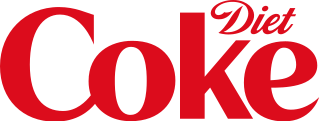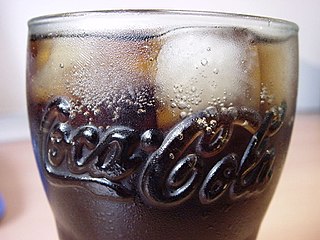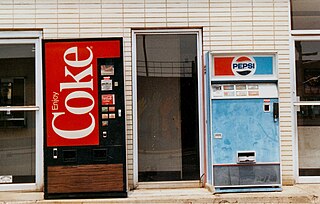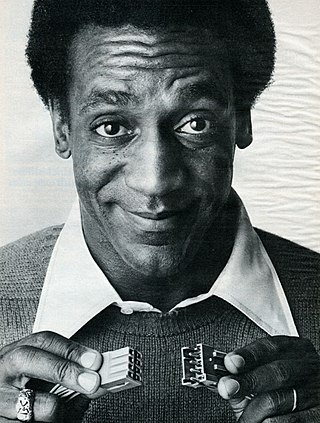
Coca-Cola, or Coke, is a cola soft drink manufactured by the Coca-Cola Company. In 2013, Coke products were sold in over 200 countries and territories worldwide, with consumers drinking more than 1.8 billion company beverage servings each day. Coca-Cola ranked No. 94 in the 2024 Fortune 500 list of the largest United States corporations by revenue. Based on Interbrand's "best global brand" study of 2023, Coca-Cola was the world's sixth most valuable brand.

Cola is a carbonated soft drink flavored with vanilla, cinnamon, citrus oils, and other flavorings. Cola became popular worldwide after the American pharmacist John Stith Pemberton invented Coca-Cola, a trademarked brand, in 1886, which was imitated by other manufacturers. Most colas originally contained caffeine from the kola nut, leading to the drink's name, though other sources of caffeine are generally used in modern formulations. The Pemberton cola drink also contained a coca plant extract. His non-alcoholic recipe was inspired by the coca wine of pharmacist Angelo Mariani, created in 1863.

Pepsi is a carbonated soft drink with a cola flavor, manufactured by PepsiCo. As of 2023, Pepsi is the second most valuable soft drink brand worldwide behind Coca-Cola; the two share a long-standing rivalry in what has been called the "cola wars".

Diet Coke is a sugar-free and low-calorie soft drink produced and distributed by the Coca-Cola Company. It contains artificial sweeteners instead of sugar. Unveiled on July 8, 1982, and introduced in the United States one month later, it was the first new brand since Coca-Cola's creation in 1886 to use the Coca-Cola trademark, although Diet Coke is not listed as a Coca-Cola variant on the Coca-Cola Company’s website. The product quickly overtook the company's existing diet cola, Tab, in sales.

The Coca-Cola Company's formula for Coca-Cola syrup, which bottlers combine with carbonated water to create the company's flagship cola soft drink, is a closely guarded trade secret. Company founder Asa Candler initiated the veil of secrecy that surrounds the formula in 1891 as a publicity, marketing, and intellectual property protection strategy. While several recipes, each purporting to be the authentic formula, have been published, the company maintains that the actual formula remains a secret, known only to a very few select, and anonymous, employees. The claim that the recipe is only known to two people and that they cannot fly on the same plane due to the chance they may die, and the recipe will become unknown, is a myth and has been fact-checked multiple times.

New Coke was the unofficial name of a reformulation of the soft drink Coca-Cola, introduced by the Coca-Cola Company in April 1985. It was renamed Coke II in 1990, and discontinued in July 2002.

The Cola wars are the long-time rivalry between soft drink producers The Coca-Cola Company and PepsiCo, who have engaged in mutually-targeted marketing campaigns for the direct competition between each company's product lines, especially their flagship colas, Coca-Cola and Pepsi. Beginning in the late 1970s and into the 1980s, the competition escalated until it became known as the cola wars.

Crystal Pepsi is a cola soft drink made by PepsiCo. It was initially released in the United States and Canada from 1992 to 1994. It was briefly sold in the United Kingdom and Australia.

The Coca-Cola Company is an American multinational corporation founded in 1892. It manufactures, sells and markets soft drinks including Coca-Cola, other non-alcoholic beverage concentrates and syrups, and alcoholic beverages. Its stock is listed on the New York Stock Exchange and is a component of the DJIA and the S&P 500 and S&P 100 indexes.

OK Soda is a discontinued soft drink created in 1993 that courted the American Generation X demographic with unusual advertising tactics, including neo-noir design, chain letters and deliberately negative publicity. After the soda did not sell well in select test markets, it was officially declared out of production in 1995 before reaching nationwide distribution. The drink's slogan was "Things are going to be OK."

Diet Pepsi, currently stylised in all caps as PEPSI DIET, is a diet carbonated cola soft drink produced by PepsiCo, introduced in 1964 as a variant of Pepsi with no sugar. First test marketed in 1963 under the name Patio Diet Cola, it was re-branded as Diet Pepsi the following year, becoming the first diet cola to be distributed on a national scale in the United States. In the 1960s and 1970s, its competition consisted of the Coca-Cola Company's subsequently discontinued Tab. The United States represents the largest single market for Diet Pepsi.
The Pepsi Challenge is an ongoing marketing promotion run by PepsiCo since 1975. It is also the name of a cross country ski race at Giant's Ridge Ski Area in Biwabik, Minnesota, an event sponsored by Pepsi.

Pepsi Stuff was a major loyalty program launched by PepsiCo, first in North America on March 28, 1996 and then around the world, featuring premiums — such as T-shirts, hats, denim and leather jackets, bags, and mountain bikes — that could be purchased with Pepsi Points through the Pepsi Stuff Catalog or online. Customers could acquire points from specially marked Pepsi packages and fountain cups. Additional points were sold both by Pepsi and by consumers, the latter mainly enabled by eBay. The first Pepsi Stuff promotion ended on October 31, 1996. It was relaunched 12 years later on February 1, 2008, ended on December 31, 2008, and was relaunched as Pepsi Pass in August 2015. Pepsi Stuff was relaunched on January 22, 2018 with retro editions of Pepsi, and ended on February 28, 2019.
Energy Brands, also doing business as Glacéau, is a privately owned subsidiary of The Coca-Cola Company based in Whitestone, Queens, New York, that manufactures and distributes various lines of drinks marketed as enhanced water. Founded in May 1996 by J. Darius Bikoff with an electrolyte enhanced line of water called Smartwater, Energy Brands initially distributed its products to health food stores and independent retailers in the New York area. Adding Fruitwater and Vitaminwater to its line in 1998 and 2000, respectively, the company expanded to nationwide distribution in the early 2000s.
Tab Clear was a variation of Tab. It is Coca-Cola's contribution to the short-lived "clear cola" movement during the early 1990s. It was introduced in the United States on December 14, 1992, in the United Kingdom a month later and in Japan in March 1993 to initially positive results. Tab Clear was, however, discontinued after only a short time of marketing in 1994. Unlike most other "clear" soft drinks, Tab Clear contained caffeine and, according to the company, had the flavor of cola.
The Pepsi Generation, is the theme of an advertising campaign for Pepsi-Cola, a US brand of soft drink, that launched in 1963 as the result of a slogan contest. A new car was awarded to the writer of the winning slogan. The contest was the brainchild of Alan Pottasch, a PepsiCo advertising executive, and it was won by Appleton, Wisconsin resident, Ellen M. Reimer. Her slogan invited consumers to "Come Alive! You're the Pepsi Generation!" The original "Come Alive" jingle was performed by singer Joanie Sommers in her memorable "breathy" vocal style. As of 2024, this logo is still used on merchandising.

American comedian and actor Bill Cosby was a popular spokesperson for advertising from the 1960s – before his first starring television role – until the early 2000s. He started with White Owl cigars, and later endorsed the Jell-O frosty ice pop treats Pudding Pop, gelatin, Del Monte, Ford Motor Company, Coca-Cola, American Red Cross, Texas Instruments, Service Merchandise, E. F. Hutton & Co., Kodak, and the 1990 United States Census. As of 2002, Cosby held the record for being the longest-serving celebrity spokesperson for a product, through his work with Jell-O. In 2011, he won the President's Award for Contributions to Advertising from the Advertising Hall of Fame.

Coming Together is a 2-minute ad created and distributed by the Coca-Cola Company and launched on the night of January 14, 2013, on several cable networks.

The Pepsi Cool Cans are a series of promotional cola cans produced in 1990 with four different designs, as part of a PepsiCo advertising campaign. The designs passed into folklore, particularly the one titled Neon, due to the belief that the word SEX was hidden in that design.

In the Space Cola Wars, the major soft drink competitors Coca-Cola and Pepsi engaged in costly marketing campaigns and product tests to get their beverages into space, in continuation of the so-called "Cola Wars". The competition began in 1985 during the STS-51-F Space Shuttle mission, when astronauts tested specially designed soda cans from each company to see how the carbonated drinks would perform in microgravity. In a widely publicized experiment, Coca-Cola's sophisticated fluid dispenser performed better than Pepsi's modified shaving cream can in dispensing drinkable soda.
















